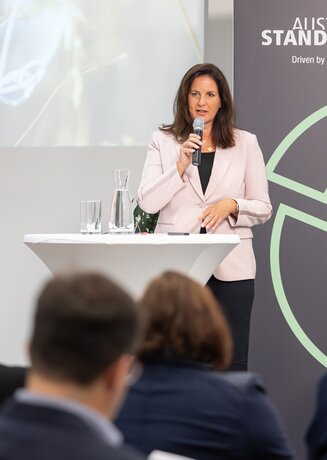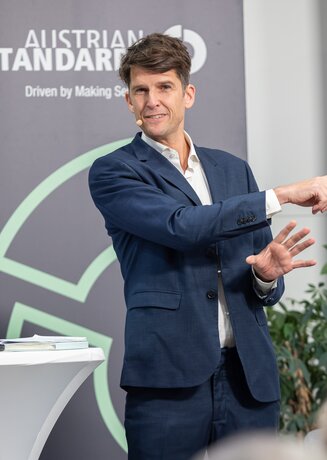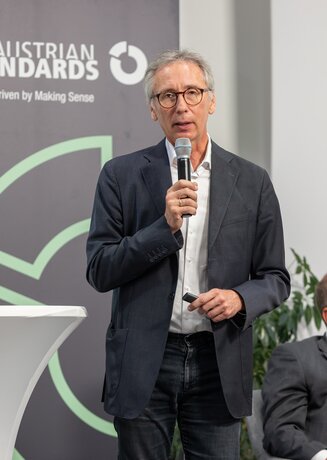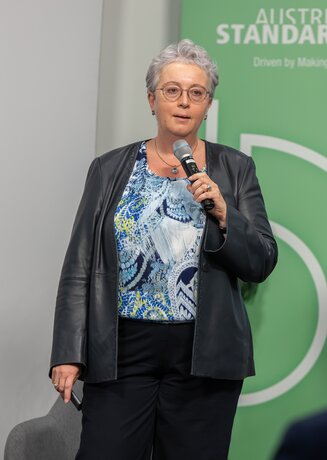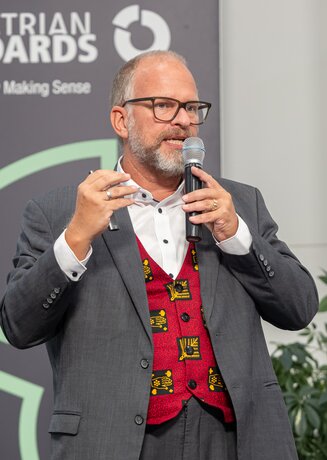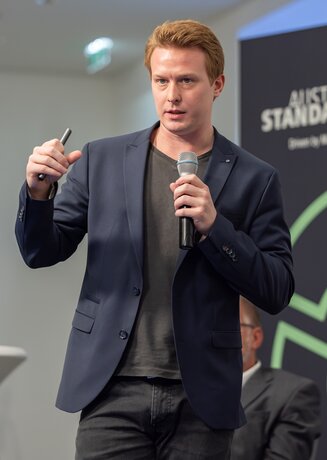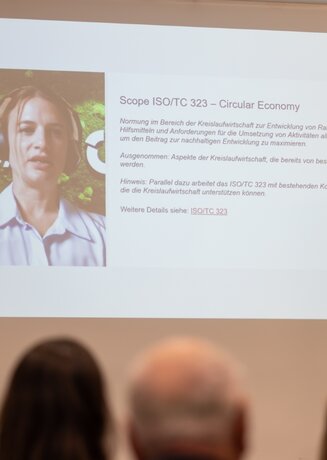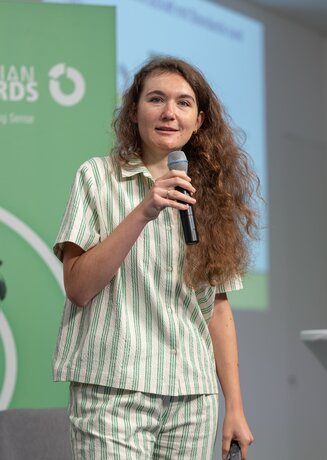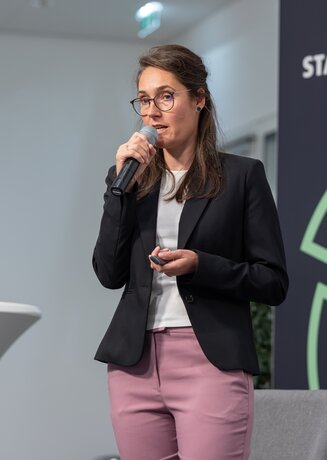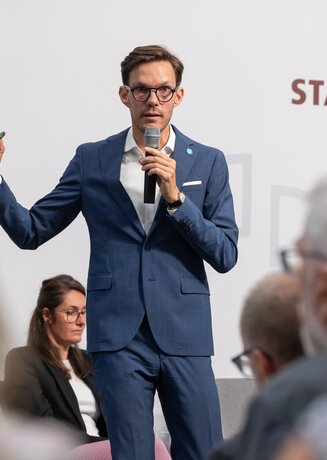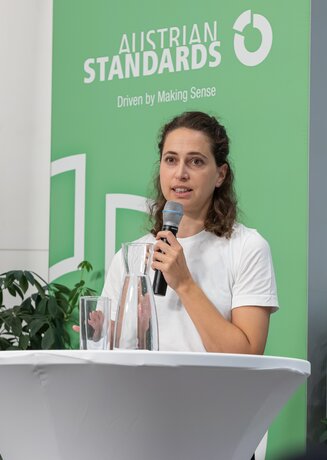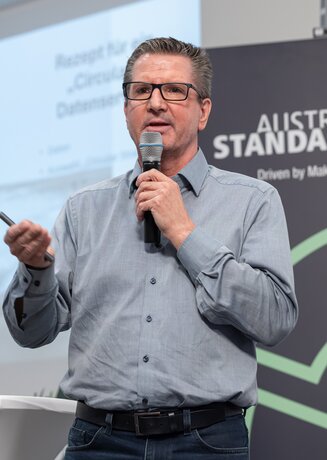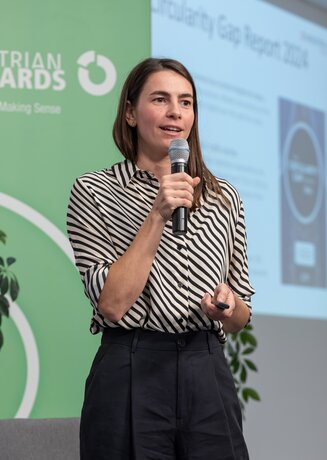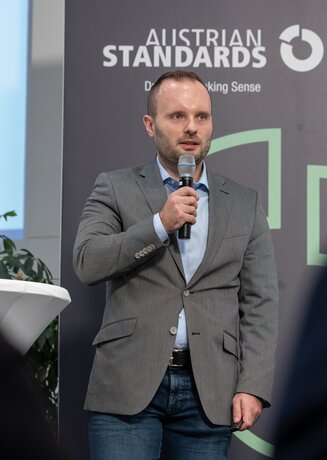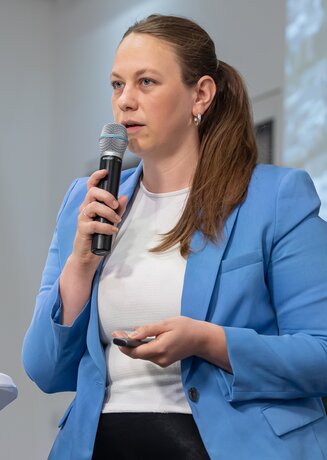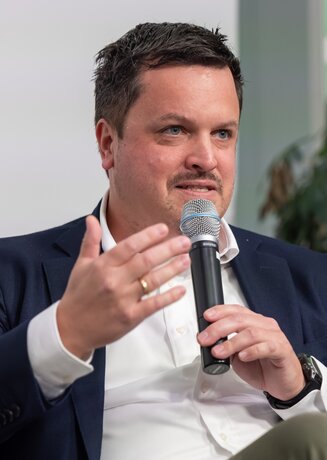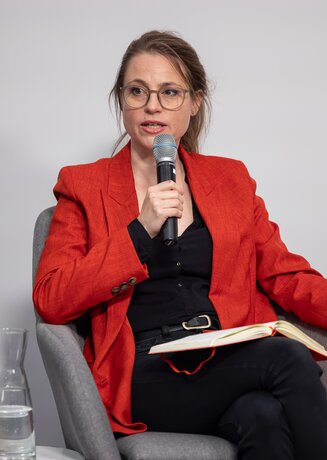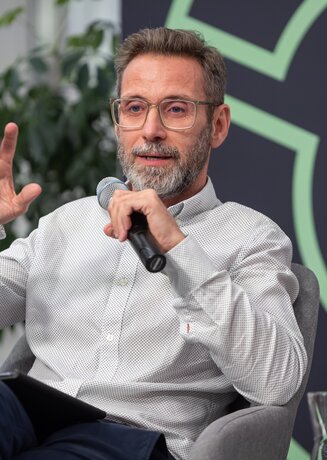
Expert Talks 2024
Circular Economy
‘How the circular economy runs smoothly with standards’ was discussed by experts at the Expert Talks organised by Austrian Standards in cooperation with Circular Economy Forum Austria on 24 September 2024.
We can only overcome the challenges of the climate crisis and the scarcity of resources by transitioning from a linear economy to a circular economy. How we get there, what role standardisation plays and what barriers still stand in the way were discussed in detail on the podium and in conversation with the interested audience.
Moderated by Harald Friedl, Member of the Board, Circular Economy Forum Austria, a renowned panel of experts presented new findings, best practices and discussed open questions relating to the circular economy with lively participation from the audience.
A question of safety
In her welcoming address, Austrian Standards CEO Valerie Höllinger emphasised that standardisation always seeks consensus and has relied on swarm intelligence for more than a hundred years when it comes to finding smart solutions. Bold, global ideas and equally clever solutions are needed to achieve the structural change from a linear economy to a circular economy.
In view of international endeavours and progress, Harald Friedl was optimistic that change is possible. After all, the circular economy is also a question of resource security. Keeping resources in the cycle increases the independence of states and communities.
Standards are an aid to practice
The first panel focussed on regulatory instruments as enablers. How can laws and standards help to boost the circular economy? What hurdles need to be overcome? Andreas Tschulik, Head of the Department of Corporate Environmental Protection, Federal Ministry for Climate Action, Environment, Energy, Mobility, Innovation and Technology, Karin Fuhrmann, Partner, TPA Austria, Axel Dick, Authorised Representative Head of Business Development Environment and Energy, ESG, Quality Austria, Raphael Schranz, Circular Economy Specialist, Circular Economy Consulting and Alena Rabitz, Committee Manager, Austrian Standards, spoke about this.
Their presentations made it clear that standards can provide companies with practical assistance in implementing legislation. The role of digitalisation, blockchain technology and AI was also the subject of lively discussion.
Growth in the circular economy
The event continued with another exciting block of topics: there were insights into best practice examples and research results from a wide range of perspectives, showing that growth and the circular economy do not have to be a contradiction in terms. However, it also became clear that the re-use of construction products, for example, is still a long way from becoming a profitable business model. The major role of standardised data for the economic implementation of the circular economy was clearly emphasised by several speakers.
Christine Bertl, Circular Bioeconomy Scientist & Project Manager, alchemia-nova GmbH, Michaela Theurl, Senior Expert - Life Cycle Assessment (LCA) & Environmental Footprinting (EF), Umweltbundesamt GmbH, Gregor Gluttig, Member of the Board, Circular Economy Forum Austria, and Anna Hagen, Architect, nonconform zt gmbh, agreed that the circular economy harbours great opportunities for companies and that these must be seized. After all, the circular economy has many economic advantages. For example, companies would benefit from lower resource consumption, reduced energy consumption and higher product safety and quality.
The role of design, technology and innovation
Afterwards, Gert Breitfuss, Senior Researcher Data Driven Business, Know-Center GmbH, Verena Halmschlager, Senior Project Manager, Verein Industrie 4.0 - die Plattform für intelligente Produktion, Gerald Schneikart, Senior Researcher, FHWien der WKW, Tristan Tallafuss, Managing Director, BRV - Österreichischer Baustoff-Recycling Verband, and Sabrina Seebacher, Team Leader Sustainable Construction Waste Management & Environment, PORR Umwelttechnik GmbH, spoke about technical solutions and innovations.
There were also fascinating insights into what can be expected from the product passport, what role the EU Design Directive is already playing and how companies can develop the system change into a successful business model for themselves.
Sticking to old patterns is not an option
Thomas Glanzer, Head of Business Development & Sustainability, ALUKÖNIGSTAHL GmbH, Dr Julia Schmitt, Deputy Director, Institute for Integrated Quality Design (IQD), Johannes Kepler University Linz, Rainer Pamminger, Senior Researcher, Vienna University of Technology, and Kilian Kaminski, Founder, refurbed, spoke about cradle to cradle, supply chains, the potential of the circular economy and the framework conditions for cooperative business models and how standards can support co-opetition in the concluding panel discussion.
There was a consensus in this panel that a lot has already happened in recent years to initiate the transition to a circular economy, but that it will still take a lot of perseverance, courage and commitment before the circular economy can actually run smoothly. Remaining stuck in a linear economy based on the old model is not an option - there was a general consensus on this during the expert talks.
© APA/Photographer Krisztian Juhasz
